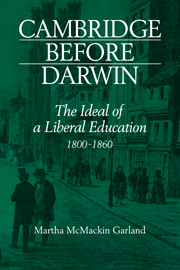Book contents
3 - Mathematics – the core of ‘permanent studies’
Published online by Cambridge University Press: 07 October 2011
Summary
Would you study Surgery? The Differential Calculus treats of the peculiar affections of the groin, and will facilitate the treatment of consumption, and all other diseases of the liver, by making you fully acquainted with the structure of the latus rectum. The Accoucheur may arrive at skill and eminence in his art, by investigating the generation of solids. The Natural Philosopher should study eccentricities; and the Moral Philosopher the theory of rational functions. The Botanist may learn easy methods of discovering roots; the Antiquarian may examine the Arc … Ergo, Mathematics ought to be the especial study of every member of the human family.
This undergraduate lampoon of an introductory lecture in mathematics articulated a fundamental truth about early nineteenth-century Cambridge attitudes: the discipline of mathematics was at the very heart of the University. It formed the basic subject matter for all the undergraduates; until 1822 it was the only, and, until the fifties the most highly regarded, route to academic honor; it was generally viewed as the only really effective means of strengthening a man's intellectual capacities and academic self-discipline. At least in part out of respect for Newton and his memory the subject was endowed with a mystique which made it an object of near religious veneration. It is not surprising that many of the improvements and reforms which the University undertook during the first half of the century were related to mathematics.
Change began as early as the second decade of the century with the arrival at the University of a group of very talented undergraduate mathematicians.
- Type
- Chapter
- Information
- Cambridge Before DarwinThe Ideal of a Liberal Education, 1800–1860, pp. 28 - 51Publisher: Cambridge University PressPrint publication year: 1980



